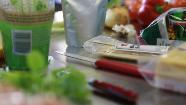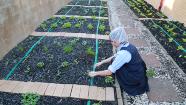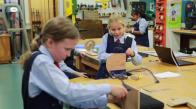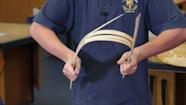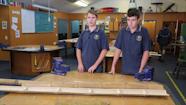Ann Davis makes pies and Christmas cakes in a cottage on the farm in Gisborne.
Food processing in a local environment – Hinterland Express Old Cottage Cakery
Transcript
Ann Davis: My business is Hinterland Express and we call it "The Old Cottage Cakery" with making gourmet pies, fruit cakes and I’m hoping to go into cheesecakes with our own fruit toppings. We started about 18 years ago from tiny little beginnings, because I needed some extra travel money and someone suggested I make fruit cakes, because I always make Christmas cakes for the family. Make Christmas cakes and sell them at the art mart, which I did one year, and from that first 300 dollars I made from these few fruit cakes that I had sold, a lady in town who had a shop she asked if I might make Christmas cakes for her and she would sell them on and I thought "Oh!". So then I had to sit down and work out how much a cake was worth, how much time I put into it, how much the ingredients cost me etc, etc. So it sort of it worked out, that was the first year and I made enough money to almost pay my air fare to Canada so that I could go with my daughter. So from that I went around different cafes in Gisborne and asked if they might be interested in me doing a little bit of baking for them; slices and things that weren’t high risk and that would keep for quite a while, as in storage.
Serena Davis: Mum and I had joked for years about buying this cafe and doing this and doing that, so, we ended up buying a cafe.
Ann Davis: We took it over in the summer, in February and of course the main food we made then was sandwiches. We did smoothies, fruit juices, and fresh fruit juices, and smoothies and that was the main income. Then as we progressed into winter, all of that dropped off a little and we thought, we needed to make something that would bring our income up again. We progressed to pies, and someone said, "Yeah you’d make lots of money out of pies". But anyway, I started doing it, I started off with two or three different flavours and we called them gourmet Gisborne pies.
Serena Davis: It was neat being able to run your own business, working in hospitality your whole life and then actually being your own boss, being able to say well this is the way I want it. This is how it’s actually going to be. In the end it was just so time consuming, just someone would get married and then one of us would have to choose who got to go and who had to stay and run the shop and it just got to be a bit of a nightmare, so after...we decided to put it on the market.
Ann Davis: I stopped making pies for a whole year because I really needed some time out.
Serena Davis: I decided I was never going to work in hospitality again! So then, started running a friend’s winery!
Ann Davis: One of our clients caught up with me and asked would I make pies again, as in family size pies for her and her workmates, for their families.
Serena Davis: Mum started making the odd pie again for odd people and then I’d come up here and maybe, help her out in the weekends and stuff doing some pies and Mum suggested we make the business something more. So, we’re in the process at the moment of expanding the pies and the Christmas cakes, so we’re going to try cheesecakes, we’re getting into doing cheesecakes.
Ann Davis: I send out an email to different businesses in Gisborne and there are several of them, and just word of mouth from each of the businesses, they have talked to others and other folk have emailed or phoned to see if I would send my list to them and so it’s gone on and now I’m selling loads of pies again, but it’s not as intense as it was having a cafe.
Related videos
Real food, real fast (02:35)
Students were set a brief to develop a faster, fresher, healthier takeaway based on an analysis of a traditional recipe....
A food bag for a family dinner (03:31)
With a focus on using seasonal produce and their families as stakeholders, students produced great recipes and food bags for a family dinner....
My context and issue (04:57)
Year 13 students share about the contexts and issues they have chosen in their food technology programme.
Engaging contexts in product design (03:09)
Abby Dingle discusses materials and tools that engage students in product design.
Combining knowledge and practice (01:58)
Steve Andrew explains how understanding materials is essential for effective technological practice.
Linking hands-on experiences and understandings (03:54)
Hands-on experiences allow the students to see materials understandings in action.
Play, experiment, explore (02:55)
Steve Andrew lets the students see, feel, and play with products to develop their understandings in materials.
Finding materials to meet the specs (02:36)
Steve Andrew shares how students identify material specifications in a brief and then test materials to find those that are suitable....
School–industry relationship cuts both ways (03:36)
Steve Andrew and Terry Rillstone describe the way the relationship between St John's College and The Shop has benefits for them both....
Pushing the boundaries with materials (02:53)
Steve Andrew describes how his senior students have the confidence to select and work with unfamiliar materials.
Exploring unfamiliar materials (02:44)
Year 12 students from St John's College describe what they know about bamboo and how they are applying this knowledge to their projects....
Students and teachers talk about testing materials in year 11.
Manipulating, forming, and transforming
Students in year 10 describe manipulating, forming, and transforming materials.
Evaluating materials for an outcome
Steve Andrew and students talk about using their knowledge to test materials for their projects at year 12.
Year 10 students describe some of the attributes for the snake skates they are developing.
Senior students select their own issues
Year 12 students talk about the issues that they have selected for their projects.

